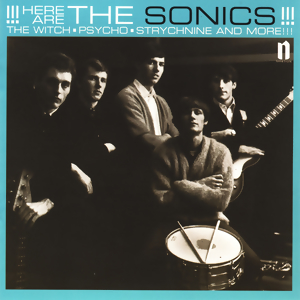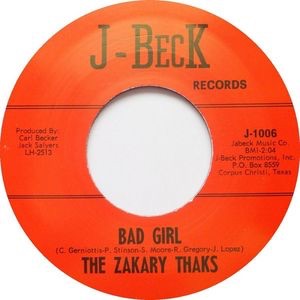Garage rock is a raw and energetic style of rock music that flourished in the mid-1960s, most notably in the United States and Canada, and has experienced a series of subsequent revivals. The style is characterized by basic chord structures played on electric guitars and other instruments, sometimes distorted through a fuzzbox, as well as often unsophisticated and occasionally aggressive lyrics and delivery. Its name derives from the perception that groups were often made up of young amateurs who rehearsed in the family garage, although many were professional.

Nuggets: Original Artyfacts from the First Psychedelic Era is a compilation album of American psychedelic and garage rock singles that were released during the mid-to-late 1960s. It was created by Lenny Kaye, who was a writer and clerk at the Village Oldies record shop in New York. He would later become the lead guitarist for the Patti Smith Group. Kaye produced Nuggets under the supervision of Elektra Records founder Jac Holzman. Kaye conceived the project as a series of roughly eight LP installments focusing on different US regions, but Elektra convinced him that one double album would be more commercially viable. It was released on LP by Elektra in 1972 with liner notes by Kaye that contained one of the first uses of the term "punk rock". It was reissued with a new cover design by Sire Records in 1976. In the 1980s, Rhino Records issued Nuggets in a series of fifteen installments, and in 1998 as a 4-cd box set.

Lenny Kaye is an American guitarist, composer, and writer, notable for his work with the Patti Smith Group, his contributions to music magazines, and his garage rock retrospective anthology Nuggets.

The Sonics are an American garage rock band from Tacoma, Washington, that formed in 1960. Their aggressive, hard-edged sound has been a major influence on punk and garage music worldwide, and they have been named inspirations to the White Stripes, LCD Soundsystem, Nirvana, The Hives, and other musical artists.

The Shadows of Knight were an American rock band from Chicago, Illinois, that played a version of British blues influenced by their native city. When they began recording in 1965, the band's self-description was "the Stones, Animals and the Yardbirds took the Chicago blues and gave it an English interpretation. We've taken the English version of the Blues and re-added a Chicago touch," to which rock critic Richie Unterberger commented: "The Shadows of Knight's self-description was fairly accurate."

The Brogues were an American garage rock band formed in Merced, California, in 1964. Much of the group's brief recording career was marked by distorted-guitar melodies and R&B-influenced vocals. They released two regionally successful singles in their brief existence, most notably the Annette Tucker and Nancie Mantz-penned "I Ain't No Miracle Worker", which is now considered a classic of the garage rock genre. The song has also appeared on several compilation albums and has been covered by other music artists.

Count Five was an American garage rock band formed in San Jose, California in 1964, best known for their hit single "Psychotic Reaction".
The Wailers, often known as The Fabulous Wailers, were an American rock band from Tacoma, Washington. They became popular in the Pacific Northwest from the late 1950s to the early 1960s, performing saxophone-driven R&B and Chuck Berry rock and roll. Their biggest hit was "Tall Cool One", first released in 1959, and they have been credited as being "one of the very first, if not the first, of the American garage bands."

The Remains were a mid-1960s American garage rock group from Boston, Massachusetts, led by Barry Tashian. Although the Remains never achieved national success, they were very popular in New England, and were one of the opening acts on the Beatles' final US tour in 1966.

Here Are the Sonics is the debut album by American garage rock band the Sonics, released in March 1965. The album features the original songs "The Witch", "Psycho", "Boss Hoss" and "Strychnine", along with an assortment of rock and roll and R&B covers.
Nuggets is a series of compilation albums, started by Elektra Records in 1972 and continued by Rhino Records thereafter. The series focuses primarily on relatively obscure garage and psychedelic rock songs from the 1960s, but with some hits and pop-oriented songs also included.
The Rationals were an American rock band from Ann Arbor, Michigan.

"Can't Seem to Make You Mine" is a song by American rock group the Seeds, written by vocalist Sky Saxon and produced by Marcus Tybalt. It was released as a single in 1965 and re-issued in 1967, when it peaked at number 41 on the U.S. Billboard Hot 100 chart, and number 33 in Canada.

No Way Out is the debut album by the American garage rock band The Chocolate Watchband, and was released in September 1967 on Tower Records. It blended both garage and psychedelic rock influences, and was marked by distorted guitar instrumentals that were early examples of protopunk. It features the band's harder-edged interpretations of songs, with only three original compositions. The album was preceded by two non-album singles, "Sweet Young Thing" and "Misty Lane", and track singles, "No Way Out" and "Are You Gonna be There ". However, none of the singles managed to chart. Like its singles, No Way Out failed to reach the Billboard 200, but it established the group as a popular live act, and later became noted as a garage rock classic.

"A Public Execution" is a song performed and recorded by the American band Mouse and the Traps, also credited simply as Mouse, written by Ronny "Mouse" Weiss (né Ronald Lon Weiss; born 1942) (music) and Knox Henderson (né Knox Holmes Henderson; 1939–2002) (words), and first released as the group's debut single on Fraternity Records in December 1965. The song was a big regional hit in Texas and peaked in the lower reaches of the Billboard charts, but has become better-known today, in large part, due to the band's uncanny imitation of Highway 61 Revisited-era Bob Dylan.

"Bad Girl" is a song by the American garage rock band the Zakary Thaks, written by the whole group—Chris Gerniottis, Pete Stinson, Stan Moore, Rex Gregory, and John Lopez—and was first released for the band's debut single on J-Beck Records in July 1966. The song was an immensely successful regional hit in Texas, precipitating "Bad Girl"'s national release on Mercury Records later in the year. Since its initial distribution, the tune has received further recognition for its appearance on several compilation albums.

The Palace Guard was an American garage rock band formed in Los Angeles, California in 1964. Though the band never obtained national success, they made a huge splash in Southern California with their song "Falling Sugar". The group is also notable for featuring the first commercial appearance of Emitt Rhodes, later a member of the Merry-Go-Round.

The Underdogs were an American garage rock band from Grosse Pointe, Michigan who were active in the 1960s. They became a regular attraction at the Hideout, a club that was an early venue for acts such as Bob Seger, Glenn Frey, and The Pleasure Seekers, featuring Suzi Quatro, and it also served as the home to the Hideout record label, which released several of the Underdogs' singles. The group enjoyed success in the region and came close to breaking nationally with two records released through a joint deal on Reprise Records and then their last on Motown. The Underdogs' work has been included on various garage rock compilations such as the 1998 Nuggets 4-CD box set released on Rhino Records.














